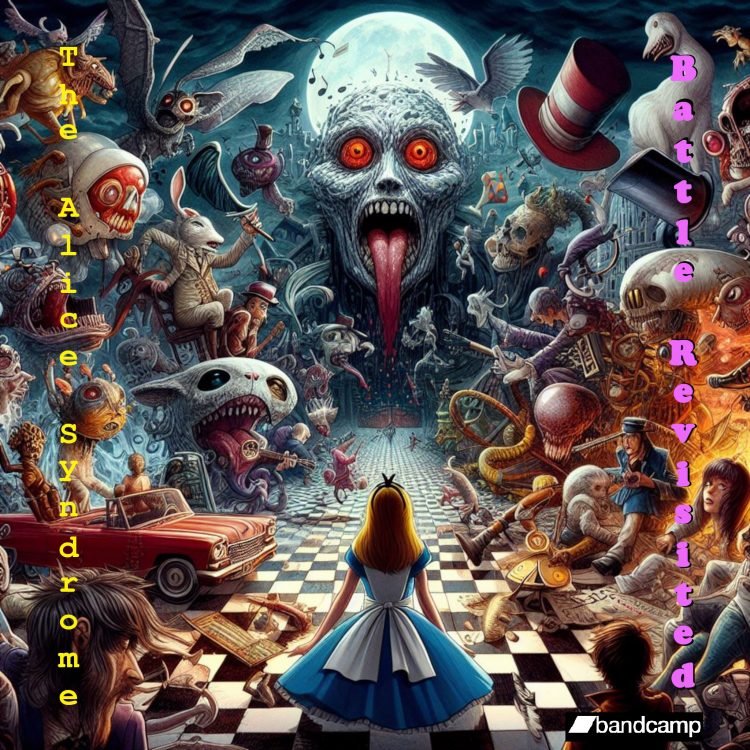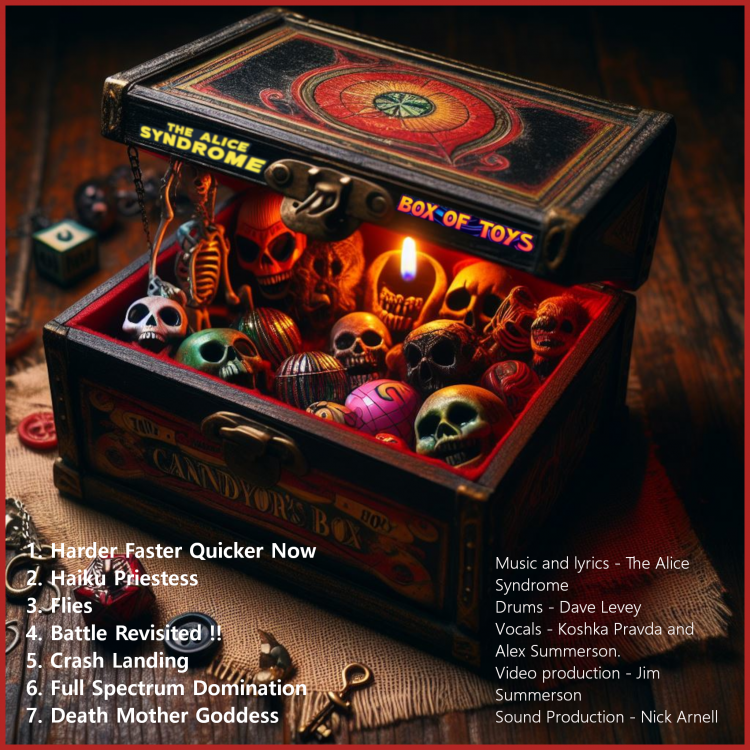
Welcome to George’s blog. I play keyboards in the Alice Syndrome, and I’m also very interested in psychology, spirituality and self-transcendence. Groovhead tends to write all our lyrics, which always touch on subjects that hit deep into my interests.
Can success kill a band’s transcendence?
This is a difficult question to answer, but it is a common observation that many bands lose their way after reaching a peak of popularity and recognition. They stop growing artistically and creatively, and instead repeat the same formula that brought them success. Is this because of external pressure from their management or fans, or is it because of internal factors such as complacency or lack of inspiration? This question has been explored by some scholars and critics who have examined the relation between music and transcendence.
Transcendence is a term that can have different meanings, but in general, it refers to an experience that goes beyond the ordinary perception and reality, and connects one with something greater, mysterious, or spiritual. Music can be a powerful medium for inducing such experiences, as it can evoke emotions, memories, images, and sensations that transcend the mundane and rational. It can also be a way of expressing one’s identity, values, and beliefs, and of communicating with others who share them.
Music can lead to success by attracting audiences, generating revenues, creating opportunities, or influencing culture. However, success can also have a negative impact on music and transcendence. Success can create expectations and demands that limit the artistic freedom and experimentation of musicians.
The issue of success and transcendence is not a simple one, but rather a complex and nuanced one that depends on various factors and perspectives. Bands and musicians who achieve success often find themselves coming under various pressures, both internally and externally, for example:
- Some fans may prefer bands to stick to their original sound and style, while others may appreciate their willingness to experiment and evolve.
- Some critics may judge bands based on their musical quality and innovation, while others may consider their social relevance and impact.
- Some bands may seek to balance their artistic vision and commercial appeal, while others may prioritize one over the other.
For example, Bob Dylan faced backlash from his fans when he switched from acoustic to electric guitar in the mid-1960s, as they accused him of betraying his folk roots and selling out to the mainstream (Sounes, 2001).
Success can also make musicians lose touch with their original motivation and passion for making music, and instead focus on pleasing the market or maintaining their status. For instance, Kurt Cobain struggled with depression and addiction as he felt overwhelmed by the fame and pressure that came with being the leader of Nirvana, the most popular rock band of the early 1990s (Cross, 2001).
Success can also alienate musicians from their fans or peers, who may perceive them as sell-outs or traitors to their genre or culture. For example, Taylor Swift faced criticism from her country fans when she transitioned to pop music in the late 2010s, as they felt she abandoned her roots and authenticity for commercial success (Caramanica, 2019).
Therefore, success can be a double-edged sword for musicians who seek transcendence through music. While success can bring rewards and recognition, it can also pose challenges and risks that may compromise the quality and integrity of music. Musicians who aspire to achieve both success and transcendence need to balance their artistic vision and personal values with the demands and expectations of the industry and the audience.
Bands accused of losing their mojo
Some examples of bands that have been accused of losing their transcendence after achieving success are U2, Metallica, Coldplay, and Radiohead. These bands have been criticized for changing their style, compromising their integrity, or becoming too mainstream or commercial. However, some of these bands have also defended their choices as artistic evolution, creative challenge, or social engagement. Therefore, the question of success and transcendence is not only a matter of musical quality, but also of personal taste, preference, and interpretation.
For instance, U2 have been accused of “selling out” by adopting a more pop-oriented sound in the 1990s and collaborating with producers such as Brian Eno and Daniel Lanois. However, the band’s lead singer Bono has argued that “we were trying to make music that was more relevant to the world we lived in” (Bono, 2006, p. 12).
Similarly, Metallica have faced backlash from some fans for experimenting with different genres and styles, such as alternative rock, symphonic metal, and country music. However, the band’s drummer Lars Ulrich has stated that “we’ve always followed our own path and done whatever we felt was right for us” (Ulrich, 2011, p. 45).
Coldplay and Radiohead have also been subject to criticism for changing their musical direction over time, but both bands have expressed their desire to explore new sounds and challenge themselves creatively. Coldplay’s frontman Chris Martin has said that “we don’t want to make the same record twice” (Martin, 2008, p. 67), while Radiohead’s guitarist Jonny Greenwood has explained that “we’re always looking for something that surprises us and makes us feel alive” (Greenwood, 2016, p. 34).
Theoretical explanations
One possible explanation for why some bands lose their creative edge after achieving success is based on the concept of musical self-concept, which refers to how individuals perceive their musical abilities, skills and identity (Mawang et al., 2019).
According to this perspective, a band that works together in obscurity may develop a high level of musical self-concept, both individually and collectively, as they express their true selves through their music and achieve a state of flow, which is a psychological state of optimal engagement and enjoyment in an activity (Csikszentmihalyi, 1990). This may result in transcendent music that attracts public attention and recognition.
However, once the band becomes successful, they may face new challenges and expectations that affect their musical self-concept. For example, they may adopt a new label of “pop star” and feel pressured to conform to the norms and standards of the music industry, which may differ from their original vision and values. They may also experience self-doubt and insecurity about their musical abilities and identity, and start to imitate other successful artists rather than following their own intuition and creativity.
As a result, they may lose touch with their true selves and their inner musicians, and present a false self to the world, including their bandmates. This may lead to a decline in empathy, communication and collaboration among the band members, as well as a loss of musical creativity and originality. Instead of producing new and innovative music that reflects their authentic selves, they may resort to repeating old ideas or copying existing ones.
Therefore, this is one way of understanding how changes in musical self-concept can affect musical creativity in bands. Musical self-concept is influenced by various factors, such as feedback, social comparison, self-evaluation and motivation (Mawang et al., 2019). A positive musical self-concept can enhance musical creativity by fostering confidence, curiosity and intrinsic motivation, while a negative musical self-concept can hinder musical creativity by inducing anxiety, boredom and extrinsic motivation. Thus, it is important for musicians to maintain a positive musical self-concept that aligns with their true selves and their musical goals, regardless of their level of success or failure.
Four-Stage Model of Creativity
We can also look at another theory which looks at creativity in music. The Four-Stage Model of Creativity (Wallas, 1926) suggests that creative thinking involves four phases: preparation, incubation, illumination, and verification.
According to this model, a band that works together in obscurity may be engaged in the preparation phase, where they gather information and explore various musical possibilities. The incubation phase may occur when they take a break from their work and let their subconscious mind process the information.
The illumination phase may happen when they have a sudden insight or inspiration that leads them to create a novel and original musical product. The verification phase may involve testing and refining their product until they are satisfied with it.
However, when a band becomes successful and adopts a new label, “pop star”, they may face some challenges in maintaining their creative process. For instance, they may experience pressure from external sources, such as fans, critics, or producers, who have certain expectations or demands for their music. This pressure may interfere with their intrinsic motivation and enjoyment of music making, which are important factors for creativity (Amabile, 1996).
They may also experience anxiety or fear of failure or rejection, which may inhibit their willingness to take risks or experiment with new ideas (Barbot & Lubart, 2012). Moreover, they may develop a fixed mindset about their musical abilities, which may make them believe that they have a limited amount of talent or potential that cannot be improved (Dweck, 2006). This mindset may prevent them from seeking feedback or learning from their mistakes, which are essential for creativity (Ericsson et al., 2006).
Corrective strategies
To overcome these challenges and regain their transcendence, a band may need to adopt some strategies that can foster their creative thinking in music. For example, they can use the Systems Theory of Creativity (Csikszentmihalyi, 1999), which emphasizes the role of the social and cultural context in shaping and evaluating creativity.
According to this theory, a band can enhance their creativity by interacting with other musicians or artists who can provide them with support, inspiration, or collaboration. They can also expose themselves to different genres or styles of music that can broaden their musical horizons and stimulate their imagination. Furthermore, they can seek feedback from experts or peers, who can offer them constructive criticism or suggestions for improvement.
Another strategy that a band can use is to apply the Divergent Thinking approach to creativity (Guilford, 1967), which involves generating multiple possible solutions or alternatives for a given problem or task. By using divergent thinking, a band can increase their fluency, flexibility, originality, and elaboration of their musical ideas.
They can also use various techniques or tools that can facilitate divergent thinking, such as brainstorming, mind mapping, analogies, metaphors, or random stimuli. For example, a band can brainstorm different ways of expressing a certain emotion or theme through music.
They can also use mind maps to organize their ideas into categories or subcategories. Mind maps are a visual technique that can help with note-taking, revision, and brainstorming. They consist of a central topic or idea and branches that connect related concepts or information. Mind maps can show connections, provide an overview, and facilitate memory recall (The Open University, n.d.). To create a mind map, one can use software applications or draw by hand. To add references to mind map nodes, one can use the specification window and select the type of reference to insert (The Open University, n.d.).
They can also use analogies or metaphors to compare their music to something else that is unrelated but similar in some way. Furthermore, they can also use random stimuli, such as words, images, sounds, or objects, to trigger new associations or connections.
By using these strategies, a band can regain their transcendence and create more novel and original musical offerings that reflect their true self and musical intuition. They can also avoid copying others out of insecurity or conformity, and instead develop their own unique voice and identity as musicians.
As Ritter and Ferguson (2017) suggest, “listening to music can affect our cognitive abilities and creative cognition, and it is believed that this effect is caused by music’s impact on our mood” (p. 1). Therefore, by creating music that makes them happy, a band can also boost their creativity and wellbeing.
Conclusion
Success can have both positive and negative effects on musicians and their sense of transcendence, and the originality and passion they put into the music they make. Success can provide opportunities, resources, and recognition for musicians, but it can also impose constraints, pressures, and conflicts that can ultimately staunch their creative flow.
References
Amabile, T. M. (1996). Creativity in context: Update to the social psychology of creativity. Westview Press.
Barbot, B., & Lubart, T. (2012). Creative thinking in music: Its nature and assessment through musical exploratory behaviors. Psychology of Aesthetics, Creativity, and the Arts, 6(3), 231–242. https://doi.org/10.1037/a0027308
Becker J. (2004). Deep listeners: Music emotion and trancing. Indiana University Press.
Bono. (2006). U2 by U2. London: HarperCollins.
Caramanica, J. (2019). Taylor Swift’s ‘Lover’ feints toward feminism and politics. The New York Times. https://www.nytimes.com/2019/08/23/arts/music/taylor-swift-lover-review.html
Cross, C. (2001). Heavier than heaven: A biography of Kurt Cobain. Hyperion.
Gabrielsson, A. (2011). Music and transcendence. In Strong experiences with music: Music is much more than just music (pp. 159-170). Oxford University Press.
Csikszentmihalyi, M. (1999). Implications of a systems perspective for the study of creativity. In R. J. Sternberg (Ed.), Handbook of creativity (pp. 313–335). Cambridge University Press.
Csikszentmihalyi, M. (1990). Flow: The psychology of optimal experience. Harper & Row.
Dweck, C. S. (2006). Mindset: The new psychology of success. Random House.
Ericsson, K. A., Charness, N., Feltovich, P. J., & Hoffman, R. R. (Eds.). (2006). The Cambridge handbook of expertise and expert performance. Cambridge University Press.
Greenwood, J. (2016). Interview with Rolling Stone. Retrieved from https://www.rollingstone.com/music/music-news/radioheads-jonny-greenwood-on-the-making-of-a-moon-shaped-pool-106109/
Guilford, J. P. (1967). The nature of human intelligence. McGraw-Hill.
Martin, C. (2008). Interview with Q Magazine. Retrieved from https://www.qthemusic.com/articles/interviews/archive/2008/06/02/q272-coldplay
Mawang, L. L., Kigen, E. M., & Mutweleli, S. M. (2019). The relationship between musical self-concept and musical creativity among secondary school music students. International Journal of Music Education, 37(1), 78–90. https://doi.org/10.1177/0255761418798402
Ritter, S. M., & Ferguson, S. (2017). The effect of music on creative cognition. Cornerstone. https://www.cornerstonelondon.com/2020/11/01/the-effect-of-music-on-creative-cognition/
Sounes, H. (2001). Down the highway: The life of Bob Dylan. Grove Press.
The Open University. (n.d.). Note-taking techniques: Mind maps. Retrieved December 29, 2023, from https://help.open.ac.uk/notetaking-techniques/mind-maps
Visual Paradigm. (2018, May 2). Adding references to Mind Map nodes. https://circle.visual-paradigm.com/docs/mind-mapping/mind-mapping-diagram/reference-to-mind-map-nodes/
Waldron, J., & Cusick, S.G. (Eds.). (2016). Resounding transcendence: Transitions in music, religion and ritual. Oxford University Press.
Wallas, G. (1926). The art of thought. Harcourt Brace.
Ulrich, L. (2011). Interview with Metal Hammer. Retrieved from https://www.loudersound.com/features/lars-ulrich-the-10-albums-that-changed-my-life



































































